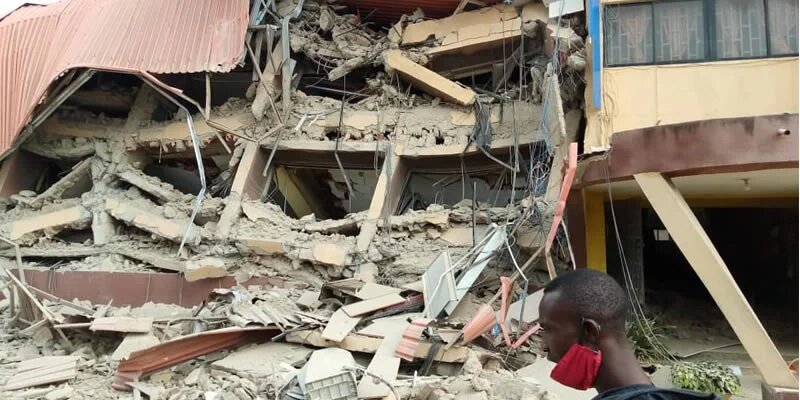Real estate experts have recommended the Lagos State Government to use the heavy stick against defaulting developers as the state’s building collapses worsen due to regulators’ poor implementation of the laws.
The appeal comes in the wake of a string of building collapses in Lagos that have put the state in the spotlight recently.
With the tragedy at Gerrard Road, Ikoyi, still fresh in the mind, 2022 began when a three-story building in the state’s Yaba region collapsed, killing at least five people.
Two months later, Lagos State was back in the news after another three-story building in Ebute-Metta collapsed. A total of ten people died beneath the rubble.
Five days after the incident at Ebute-Metta, yet another three-storey building collapsed in Ago, Okota, prompting calls by experts and industry players for the designated agencies of government to step up to their responsibilities.
According to experts, the tragic events recorded in recent years in the state might have been abated had the regulatory agencies not slumbered amid the increasing wave of shoddy and unethical practices by unscrupulous developers who had prioritised monetary gain over public safety.
A real estate expert, Alfred Olayiwola, said that lack of monitoring and enforcement had given impetus to shady practices in the industry. He cited the lethargic attitude of the government towards following up the Ikoyi building collapse incident as ample evidence.
He said, “No, they are not doing enough because there has not been monitoring. There is no effective monitoring so far. Even the incident that happened in Ikoyi, I don’t think any effective follow-up has been done. We are not hearing anything with regard to the decision they have taken. It is three buildings; if one collapses, definitely, the other two must have been affected.”

An expert in property law, Barr Ekpeyong, who took a similar stance, questioned the commitment of the regulatory agencies towards nipping these issues in the bud. He cited politicisation of the system as a major reason why the wheel of enforcement had spun slowly – a reality that has resulted in the many tragedies witnessed in the past few years.
Ekpeyong said, “No they are not doing enough. Building approvals have been politicised most times, and there is a lot of bending of the rules for certain privileged persons, which obviously leads to this ugly trend. It’s a reflection of our society, the compromise of morals.
“There are many people who move to site by simply filing building plan documents. They are friendly with people high up and then the strict supervision is waved. That leads us to all manner of building collapses, which unfortunately is not just loss of capital but loss of lives in the process.”
On the implementation of the National Building Code, he said the attitude of the authorities had contributed significantly to the delay in implementation.
“Almost everything in Nigeria is politicised. The stakeholders know the importance of the National Building Code, but unfortunately, the things that matter more to Nigerians is not kept in the front burner.”
A building expert and the Director, Centre for Applied Research and Technology Innovations, Yaba College of Technology, Dr. Akinsola Olufemi, said the enforcement net of the regulatory agencies was not widened enough to capture the realities in the industry today.
He said, “The two buildings that recently collapsed are not new buildings. They have been in existence for many years. In 2005, when I was the general secretary of the Nigerian Institute of Building, I told them when I called a press conference that more old buildings would be collapsing than new ones. The new regulation we have is specifically targeting new buildings, not old buildings that have been built many years before the regulation. The only time the regulation will focus on them is when there is a need to rehabilitate or renovate them. They do not look at buildings that have been in existence for 40, 50 years.”
According to Olufemi, the conversion of buildings originally constructed for residential purposes and the effects of the rainy season could have devastating effects on certain buildings which might eventually collapse due to the strain caused by weakened foundation or the exceeding of its intended live load.
“In Nigeria, we do not take cognizance of re-evaluation of buildings after construction. They were constructed within certain parameters. The constructions are based on the load they were supposed to carry. There is what we call live load or imposed load (the load you bring into the building after it has been constructed). It should not be more than 1.5 kilonewton per metre square, if it is a residential building. If it is a commercial building, it is 2.0 kilonewton per metre square. If it is an institutional building and religious building, it is 3.0 kilo newton per metre square.
“However, some of the residential buildings today have been converted into religious worship centres without taking cognisance of the load it was meant to carry. Apart from that, there is the effect of water on the foundation. If you design a structure to carry 100 kilogramme of load at a point the water is far from touching the foundation, the capacity of load-carrying will be reduced to 60 per cent of the original load it was built to carry when the water level increases (during the rainy season)
“That is why, in the rainy season, more buildings collapse than the dry season. This is because the water level becomes higher. Yes, the regulatory authorities are doing what they can do within their capacity, but efforts of the government should not only be focused on new buildings. It should also address existing stock of buildings because we have more of old buildings collapsing than new buildings now.”
PUNCH





Do you have a spam problem on this blog; I also am a blogger, and I was curious about your situation; we have developed some nice methods and we are looking to exchange solutions with other folks, be sure to shoot me an e-mail if interested.
Good day I am so glad I found your website, I really found you by error, while I was browsing on Digg for something else, Nonetheless I am here now and would just like to say cheers for a fantastic post and a all round exciting blog (I also love the theme/design), I don’t have time to go through it all at the moment but I have book-marked it and also added your RSS feeds, so when I have time I will be back to read a lot more, Please do keep up the fantastic job.
Hello my friend! I want to say that this article is amazing, great written and include approximately all vital infos. I’d like to see more posts like this .
It is perfect time to make a few plans for the longer term and it is time to be happy. I have read this publish and if I may I desire to counsel you few fascinating things or advice. Maybe you can write next articles regarding this article. I want to learn even more things about it!
Hey, I think your site might be having browser compatibility issues. When I look at your blog site in Firefox, it looks fine but when opening in Internet Explorer, it has some overlapping. I just wanted to give you a quick heads up! Other then that, terrific blog!
Great post.
Hi there to all, the contents present at this web page are in fact remarkable for people knowledge, well, keep up the nice work fellows.
Thank you. A lot of content.
play casino online [url=https://bhcmerced.org/#]no deposit online casinos[/url]